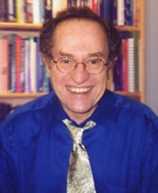September 1: Alan M. Dershowitz
Alan M. Dershowitz (1938)
It was on this date, September 1, 1938, that Harvard law professor and civil liberties lawyer Alan Morton Dershowitz was born in Brooklyn, New York. First in his class at Yale Law, he was appointed to the Harvard Law faculty at age 25 and became the youngest full professor in the school's history at age 28. He has been the Felix Frankfurter Professor of Law at Harvard Law School since 1993.
Dershowitz stood up for the First Amendment in the Harry Reems pornography case (1976). But it was his successful defense of Claus von Bülow on attempted murder charges (1984), and involvement in the rape case involving Mike Tyson, along with his participation on the "dream team" of defense lawyers that acquitted O.J. Simpson on murder charges in 1995 (Reasonable Doubts: The Criminal Justice System and the O.J. Simpson Case, 1996), that made his name nearly a household word.
Dershowitz has written extensively on law and public policy. In his 1998 Sexual McCarthyism: Clinton, Starr, and the Emerging Constitutional Crisis, he claims that the Justice Department went overboard in prosecuting President Bill Clinton for what amounted to sexual indiscretions, and in his 2001 Supreme Injustice: How the High Court Hijacked Election 2000 he maintains that the U.S. Supreme Court improperly awarded the presidency to George W. Bush. But Dershowitz has suffered great criticism for approving torture of suspects in "ticking time-bomb" instances: situations in which "a captured terrorist who knows of an imminent large-scale threat refuses to disclose it." His detractors claim this assumes a lot of prior knowledge on the part of the torturers, including actually eliciting timely and useful information through techniques demonstrably effective at eliciting the opposite.
As patron of many Jewish causes, Dershowitz says his Judaism is more cultural than spiritual. In his 1997 book, The Vanishing American Jew, he writes, "God is not central to my particular brand of Jewishness. ... Being Jewish, to me, transcends theology or deity."[1]
In a 1999 Free Inquiry article, Dershowitz expands on his religious ideas:
I am a skeptic about everything, including God and atheism. I am not certain about issues of cosmology. ... I am more certain that the miraculous stories that form the basis of most religious beliefs are myths. Yet I respect the Bible and enjoy reading and teaching it. Indeed, I find it even more fascinating as a human creation than as a divine revelation. I consider myself a committed Jew, but I do not believe that being a Jew requires belief in the supernatural. ... Indeed, it is while praying that I experience my greatest doubts about God, and it is while looking at the stars that I make the leap of faith. ... If there is a governing force, He (or She or It) is certainly not in touch with those who purport to be speaking on His behalf.[2]
[1] Alan Dershowitz, The Vanishing American Jew. New York: Little, Brown & Co., 1997, pp. 179-180. (Quoted from Celebrity Atheists.)
[2] "Taking Disbelief Out of the Closet" by Alan M. Dershowitz, Free Inquiry, Summer 1999, Vol. 19, No. 3. p. 7. (Quoted from Celebrity Atheists.)
Originally published September 2003 by Ronald Bruce Meyer.


